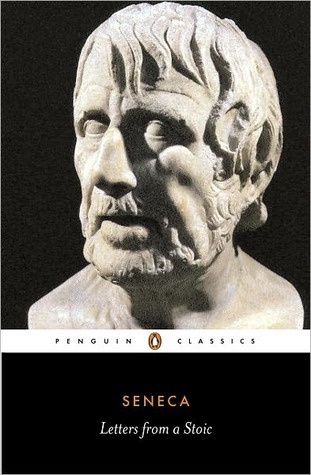More on this book
Community
Kindle Notes & Highlights
Letter 108. On the approaches to philosophy Letter 109. On the fellowship
The idea of such exercises are to learn to confront suffering and adversity, and to be prepared for it.
A “stoical person” is of course someone who suffers pain or misfortune boldly and without complaint, and, though Stoic philosophy is endlessly rich and complex, this is indeed the essence of its guidance on how to live.
What man can you show me who places any value on his time, who reckons the worth of each day, who understands that he is dying daily? For we are mistaken when we look forward to death; the major portion of death has already passed. Whatever years be behind us are in death's hands.
While we are postponing, life speeds by.
It is not the man who has too little, but the man who craves more, that is poor.
Do you ask what is the proper limit to wealth? It is, first, to have what is necessary, and, second, to have what is enough.
But if you consider any man a friend whom you do not trust as you trust yourself, you are mightily mistaken and you do not sufficiently understand what true friendship means.
Ponder for a long time whether you shall admit a given person to your friendship; but when you have decided to admit him, welcome him with all your heart and soul.
It is equally faulty to trust everyone and to trust no one. Yet the former fault is, I should say, the more ingenuous, the latter the more safe.
No man can have a peaceful life who thinks too much about lengthening it, or believes that living through many consulships is a great blessing.
Philosophy calls for plain living, but not for penance; and we may perfectly well be plain and neat at the same time. This is the mean of which I approve; our life should observe a happy medium between the ways of a sage and the ways of the world at large; all men should admire it, but they should understand it also.
Withdraw into yourself, as far as you can. Associate with those who will make a better man of you. Welcome those whom you yourself can improve. The process is mutual; for men learn while they teach.
What Chance has made yours is not really yours. [Com. Rom. Frag. p. 394 Ribbeck².]
The good that could be given, can be removed. [ibidem.]
the wise man is self-sufficient, that he can do without friends, not that he desires to do without them. When I say "can," I mean this: he endures the loss of a friend with equanimity.
'If you would be loved, love.'" [Frag.
Unblest
Happy is the man who can make others better, not merely when he is in their company, but even when he is in their thoughts! And happy also is he who can so revere a man as to calm and regulate himself by calling him to mind! One who can so revere another, will soon be himself worthy of reverence.
no prizefighter can go with high spirits into the strife if he has never been beaten black and blue; the only contestant who can confidently enter the lists is the man who has seen his own blood, who has felt his teeth rattle beneath his opponent's fist, who has been tripped and felt the full force of his adversary's charge, who has been downed in body but not in spirit, one who, as often as he falls, rises again with greater defiance than ever.
And what is baser than getting ready to live when you are already old?
It shows much more courage to remain dry and sober when the mob is drunk and vomiting; but it shows greater self-control to refuse to withdraw oneself and to do what the crowd does, but in a different way, - thus neither making oneself conspicuous nor becoming one of the crowd. For one may keep holiday without extravagance.
Set aside a certain number of days, during which you shall be content with the scantiest and cheapest fare, with coarse and rough dress, saying to yourself the while: "Is this the condition that I feared?"


